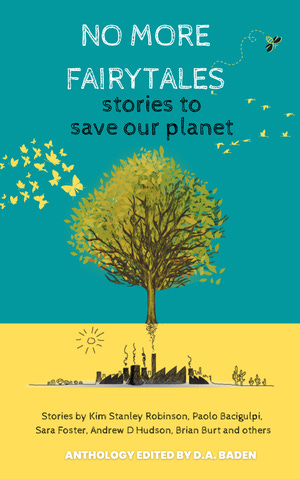Recently, Jacob Kuppermann of the The Long Now Foundation interviewed me about cli-fi, my influences, the Jenga-stack conversation that happens in science fiction, and more. It was a really fun conversation, and I’ve gotten some nice feedback on it.
In particular, fellow traveller Paul Graham Raven engaged very thoughtfully with some of what I said in the interview, as well as with my Omelian Thinking essay. Paul mulled over this particular fret of mine, which I’ve articulated here in this newsletter.
There’s a real danger that in 02050, we’ll have achieved our emissions reductions pledges and people will say, “Okay, climate emergency over. Good job.” We’ll be having climate disasters all the time, but that’ll just be the world now. And we’ve had an additional generation unfold. In 02050, people in their thirties may have never known a world before widespread climate disasters. They’ll not know the difference, and people will say, “I don’t want to fund a million DAC machines, I want a tax cut.”
PGR’s response is a kind of post I like, where one person’s riff becomes a jumping off point for another person to glom on a bunch of context. Semi-critical, but friendly, because it’s mostly just trying to articulate something that’s been in the respondent’s craw. So hopefully PGR won’t mind if I lob a similar post back across the intellectual tennis court.
Here’s the part of PGR’s post that jumped out at me the most:
I don’t think I’m being Omelian here, in ADH’s terms; I do not assume that human flourishing is necessarily predicated on suffering and exploitation. But I do believe that solarpunk’s handwaving of the supply-chain issue—which, to be fair, is a rhetorical strategy it has inherited from sf more broadly, which in turn inherited it from post-ww2 techno-optimism—means that, unwittingly or not, there is always a kid in the cupboard (or, if we want to be a bit more on the nose with the image, a kid in the rare earth metals extraction facility), they’re just beyond the scope of the story.
Certainly I agree that any “civilizational project” (my term) is going to face some serious material/supply-chain constraints——especially the ill-advised project of continuing fossil fueled business as usual. And any such effort will be both coopted and diminished if enacted under capitalism. (In fact, I’ve argued that “a DAC rig on every corner” climate repair only really makes sense under planetary socialism, since a more stable climate is a non-rivalrous, non excludable global public good.) And I appreciate PGR’s technoskepticism as a necessary caution against Silicon Valley hype cycles and modernist manias.
But I also think that twenty years ago a similar skepticism might have led one to dismiss renewable energy as a strategy for staving off climate collapse. One still sees these arguments from a certain kind of stodgy dark green, crying foul about the conditions in lithium mines or using arcane metrics to claim that solar panels are always energy-negative, that sort of thing. Personally I think they’d have better luck advocating for international mine safety reform and better wages in the lithium industry, rather than demanding that the world never manufacture another battery.
Point is, renewables turned out to be much cheaper, more efficient, and more flexible than the technoskeptics of yore thought they’d ever get. So much so that today the world’s energy transition plans rest largely on the deployment of massive amounts of renewables and electrification to replace fossil fuels (plus CDR, which is built into every pathway that holds warming to ~1.5C). There’s still time for the skeptics to be proven right on the minerals constraints, I suppose, but currently that’s the consensus strategy. No one is calling the energy transition an “easy technofix” anymore, because we now understand that it is doable and also will be enormously difficult and complicated to pull off.
And yet, some people who are very bullish on renewables——Saul Griffith and Jonathan Foley, for instance——are absurdly bearish on direct air capture. So much so that I see them boosting ridiculous gotcha takes like this. I think there’s just a category error there. DAC isn’t a decarbonization solution. It’s an approach to climate repair. Different projects, to be taken up at different times, over different intervals. Where the confusion (and, let’s be honest, territoriality) sets in is that there will be no single “Igor, throw the switch!” moment where the whole world is officially running on clean energy and we can safely turn on the DAC machines. The internals and geographies of thinking/technologizing/scaling these projects are going to overlap and entangle. Maybe they will even compete for brains/money/clout, which would be a shame. And we do need people like Foley and Griffith whose job is to rally consensus around the best strategies. But I don’t think we should shut down climate repair prototypes any more than we should shut down NASA or cancer research for squandering resources amid a more pressing crisis.
And we are still at the stage of imagining climate repair that we were with renewables 20+ years ago: we don’t know how easily it will scale, and yet we insist on guessing at the enormous (though contextless) price tag. The idea that getting off fossil fuels was too expensive——and thus a sacrifice we’d have to make for a greater good, a drag on economies——dominated climate politics for decades. Now we know that switching to renewables is often cheaper than just continuing to use existing fossil infrastructure. These things generate value and put more money into the pockets of the societies that build them out. And that’s without factoring in the gargantuan costs of dealing with a broken climate, which is the real comparison to make. The cost of not acting is so much greater than the costs of decarbonization.
I think a similar calculation may make sense with climate repair. It’s likely to be a big, energy and materially intensive project. But what are the costs of living——indefinitely——with the heavy weather that 1.5-2C warming will bring? What are the costs of year after year of super strong storms, killer heat waves, megadroughts, permanent desertification, baked-in sea level rise, and ecosystem chaos? We can adapt to some of that, but we are leaving our descendants a fundamentally less habitable world, forever. We should ask how the cost of surviving there compares to the cost of cleaning up our carbon mess.
Anyway, as always any discussion about costs is moot because the real question is “costs for whom?” Decarbonization seemed costly because rich oil companies and rich people invested in them would take a hit to their profits. Climate repair seems costly because rich people will have an easier time (they think!) adapting to a harsher climate. And because the biggest benefits will be felt by future generations, whose livelihood we very literally discount.
Cli-Fi Anthology (and Me) at COP27
A while back a guy named Steve Willis reached out to me about doing a solutions-themed climate fiction anthology to be distributed at COP27, which begins one week from today in Egypt/virtually. This idea ended up really going places, via a partnership between the Green Stories Project, Herculean Climate Solutions, the Climate Fiction Writers League, and Change Agents UK. This group has pulled a bunch of cool and imaginative pieces into this volume, No More Fairytales: Stories to Save Our Planet, edited by D.A. Baden.
Included in the TOC are excerpts from Kim Stanley Robinson’s Ministry for the Future, a Paulo Bacigalupi short story (from the Cities of Light book, which I had a hand/story in), and an excerpt from my won book Our Shared Storm. And a bunch of other interesting pieces on a range of topics, all with info about associated climate solutions projects. Hopefully some of these stories will spark ideas and conversations when they find their way into the hands of delegates and observers at COP27.
Check out the (still work in progress!) project here.
Meanwhile, it’s looking like the editor of the above, D.A. Baden, and I will both be on a recorded virtual panel sometime this COP, put together in part by some friends at the Open Air Collective and moderated by Reena Shah. We’ll be talking about cli-fi, solarpunk, carbonpunk, all that. Look out for that and a new story by me to come out on the Open Air website this November.
Interviews, Appearances, Etc.
I had the pleasure of being a guest on the ClimaTwins Podcast, hosted by 7th graders Sophie and Daniela. Their questions were really smart and thoughtful, and it made for an excellent conversation.
I also made an appearance on an ICONICS webinar about communicating the SSPs. It was great to be among the community of scholars who developed the scenarios that inspired my book. I was a little bleary, as the webinar was at 6 in the AM, but hopefully it still makes for good context around my book and the broader effort to help the public and policy makers understand the scenarios that are shaping understanding of the climate crisis.
Art Collection: Squirrel Scrolling
Picked up this print at Hazel & Violet Letterpress doing the art walk at Phoenix First Friday. I get it, little squirrel, but just go to bed. Just go to bed.






Do we have another garden update?